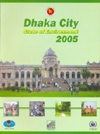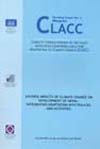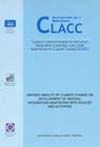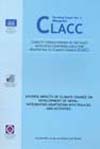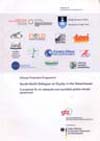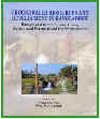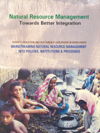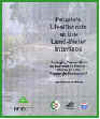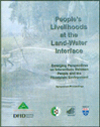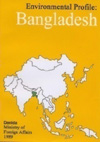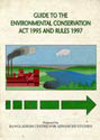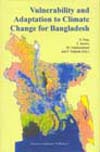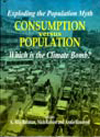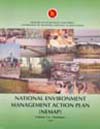EbA Evidence and Policy - click to see at iied webpage
As local country partner, Bangladesh Centre for Advanced Studies (BCAS) has been implementing the German Government Funded Project “Ecosystem-based approaches to adaptation (EbA): strengthening the evidence and informing policy” in Bangladesh for a period of three years (2016-2018) in order to address climate change vulnerabilities. EbA is defined by UN Convention on Biodiversity (CBD) as use of Biodiversity and Ecosystem services to help people to adapt adverse effects of climate change as part of an overall Adaptation strategy.
The EbA Profile is furnished below:
- Name of the Project: Ecosystem-based approaches to adaptation: strengthening the evidence and informing policy.
- Donor: The German Federal Ministry for the Environment, Nature Conservation, Building and Nuclear Safety (BMUB).
- Implementing Agency: International Institute for Environment and Development (IIED UK), IUCN & UNEP-WCMC with 12 countries (Asia:- Bangladesh, China, Nepal; Africa:- Kenya, Mali, South Africa, Uganda, Burkina Faso; Central and South America:- Peru, Chile, Costa Rica, El Salvador).
Bangladesh Centre for Advanced Studies (BCAS) has been implementing the Bangladesh component of EbA project as local partner in collaboration with the Department of Fisheries, Bangladesh.
- Period of the Project: April 2016 to December 2018 (but the project is scheduled to run until 30thJune 2019 for financial audit of the project).
- 5. Goal & Objective:
(a) Project goal: As a result of improved evidence and community-based learning, national and international climate change policy makers demonstrate improved recognition of the conditions under which ecosystem-based adaptation (EbA) is effective, and integrate EbA principles into national and international climate adaptation policy and planning processes.
(b) Specific Objectives:
(i) To assess/explore the existing evidence for EbA effectiveness to adapt to climate change effects.
(ii) Generate comparable results across the countries & initiative sites and identify knowledge gaps on EbA – when and how to address the gaps.
(iii) Recommendation to fill up those gaps.
(iv) Inform the evidences of EbA effectiveness to the national and international adaptation policy and planning processes and influence them to integrate into national and international climate change adaptation policy and planning process.
(v) Capacity building of Govt, institution and other organizations to EbA system.
- 6. Project Approach: The project will focus on a portfolio of established EbA project sites (funded by IKI and others) in 10-12 countries from across Asia, Africa and Central and South America:
i) A common research methodology will be applied to assess the evidence for EbA effectiveness and generate comparable results across the countries;
ii) Establish baselines for policy integration and the capacity of government institutions, donors and national civil society organizations and networks to incorporate evidence-based EbA measures into national adaptation processes;
iii) Translate the EbA evidence policy gap - analysis into policy recommendations, producing country-specific policy briefings and convening National Policy Dialogues to explore the opportunities for, and obstacles to, the uptake in national adaptation plans and policies;
iv) Produce practical guidance and tools to support better EbA integration into project planning and continue to further the evidence base;
v) Outreach through the Nairobi Work Programme and the UNFCCC Adaptation Committee, at key international events such as NAP supported events and through peer-reviewed journal articles and existing adaptation knowledge plat-forms and networks will help infuse EbA measures into wider policy, planning, funding priorities and international discourse.
- 7. Target Project for EbA Evidence Study in Bangladesh
The Darwin Initiative UK funded and IIED-BCAS implemented - Hilsa Project: Economic Incentive to Conserve Hilsa Fish in Bangladesh linked with the Incentive based Hilsa fishery management programme of the Department of Fisheries is the project in Bangladesh, contributing to the project’s portfolio of established EbA project sites and well-connected to national adaptation planning processes. In the incentive based hilsa fisheries management programme of DoF, the riverine ecosystem service has been used to protect Juvenile Hilsa (Jatka) and Gravid Hilsa against decline of hilsa population caused due to overfishing and habitat degradation, through imposing total fishing ban for 2-3 months in the lower Meghna river system and lower Padma (Fig-1) and providing the fishers affected due to fishing ban with incentives as payment for ecosystem service (PES) in the form of 40 kg of rice per household per month for 4 months. As a result of this intervention hilsa production and biodiversity has increased significantly.
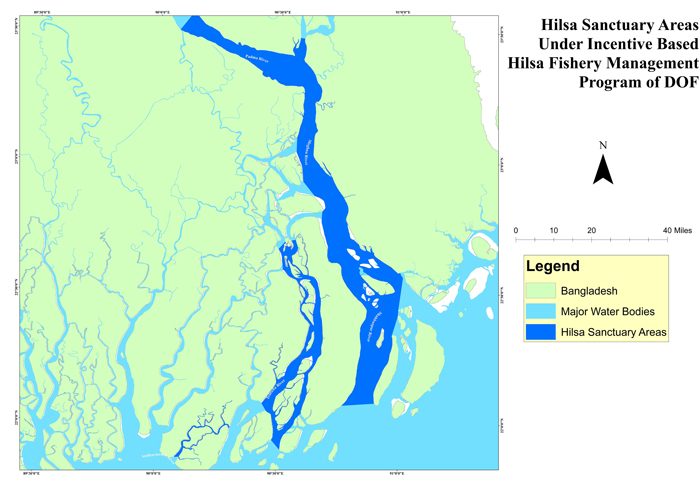
Total fishing ban area (Hilsa sanctuary area) in the lower Meghna system and the lower Padma
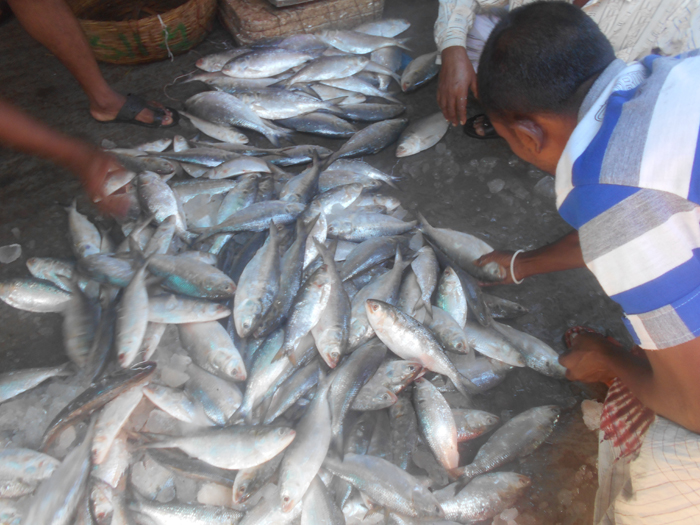
Hilsa at landing centre for whole sale
- 8. Framework of Activities and Outputs Over Time
Project activities and outputs are grouped into three work packages.
(a) Knowledge Generation: evidence of the contribution, effectiveness, limits and value for money of EbA in adaptation planning generated and documented.
(b) Policy Advocacy: evidence of EbA effectiveness and value for money promoted in national and international adaptation policy and planning processes.
(c) Institutional Strengthening: enhanced capacity of government institutions, donors and national civil society organisations and networks to incorporate evidence-based EbA measures into national adaptation processes in the selected countries and at the international level through the Nairobi Work Programme and other fora.
- 9. Activities of EbA Projects by Outputs
|
Outputs
|
Activities
|
|
Output-1
Evidence of the contribution, effectiveness, limits & value for money of EbA in adaptation planning generated & documented.
|
1.1: Contribute to project common research methodology.
|
|
1.2: Conduct research on EbA effectiveness based on the common research framework in terms of what works & what doesn’t under different contents & addressing key EbA information gaps.
|
|
1.3: Contribute to collection of research results.
|
|
1.4: Convene national validation workshops convened to consult with local experts and finalise research findings
|
|
1.5: Draft case study addressing evidence gaps
|
|
Outputs-2
Evidence of EbA effectiveness & value for money promoted in national & international adaptaion policy & planning processes
|
2.1: i) Contribute to national baseline assessment of EbA-relevant policies and opportunities for poolicy influence and ii) plan for integrating research findings into climate change and other relevant policy processes (these are live documents)
|
|
2.2: Convene National Policy Dialogue to enhance EbA understanding and skills, and identify opportunities (and co-benefits) for incorporating EbA into natioal adaptation planning.
|
|
2.3: Engage (through meetings at national level) climate change focal points, relevant parliamentary committees & other stakeholders to gain approval and support over the life of the projection EbA and ensure its relevance in the national context.
|
|
2.4: Draft country-specific policy brief inconsultation with national and sub-national government stakeholders and other actors involved in adaptation policy and planning (e.g. National climate change committees) tailored to inform key natioonal and international planning processes.
|
|
Outputs-3:
Enhanced capacity of governmental institutions, national civil society organizations & networks, & donors to incorporate evidencebased EbA messures into national adaptation processes in the selected countries & at international level through the Nairobi Work Programme & other for a
|
3.1: Contribute to i) skills survey of capacity of governmental institutions, national civil society organizations & networks, & donors to incorporate evidence-based EbA measures into natioonal adaptation processes and ii) inventry of existing ‘tools’
|
|
3.2 Review and apply project “toolbox’ to integrate EbA measures into project planning targeting programme design of national policy.
|
- 10. Progress of EbA Project
(1) Awareness/inception workshop of the EbA project was held on 13 Ocltober 2016 in the conference room of the Department of Fisheries (DoF), Dhaka, with the relevant stakeholders including policy and planning level personnel. Among others, Dr. Syed Arif Azad, DG, DoF, Dr. A. Atiq Rahman, ED, BCAS, Dr. Hannah Reid and Dr. Nathalie Seddon of IIED, UK; representatives from Planning Commission, Department of Environment, Bangladesh Fsheries Research Institute (BFRI), IUCN, University Teachers, Senior officials of DoF, BCAS & ICCCAD participated in the workshop. EbA concept and the EbA project objectives including activities and outcomes were discussed in the workshop to form an understanding and knowledge of the stakeholders about the EbA project. EbA approach being a new idea, the workshop helped form understanding and knowledge base on EbA towards integrating EbA principles into national and international climate adaptation policy and planning process.
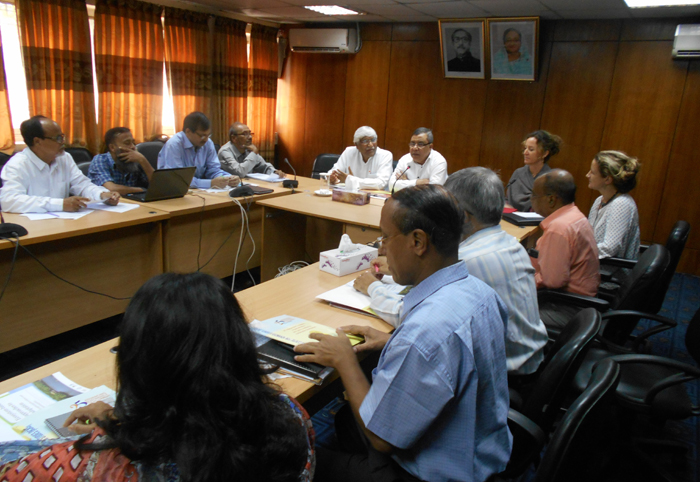
Awareness / inception workshop participants
(2) Conducted research to assess the evidence effectiveness of EbA (Economic Incentive to Conserve Hilsa Fish in Bangladesh as PES- (Payment for Ecosystem Services) for enhancing hilsa fish production and bioderversity in the riverine ecosystem in Bangladesh. Though the PES is not fully an EbA, but it has some elliment of EbA. Envidence of effectiveness and benefit of the PES programme have been found to enhance hilsa population, biodiversity, socioeconomic condition of the fishing community
(3) Policy analysis: National environmental and climate change Policies and strategies including the sectoral policies and strategies of Water, Agriculture, Forestry, Fisheries, Livestock, Environment sectors etc. have been reviewed from envoronment and climate change point of view.
Major gaps and challenges in integrating EbA into national policy processes are the lack of knowledge, experience and awareness of policy makers, administrators, planners and in general of the people about the importance and benefit of ecosystem based adaptation.
The national policy makers, planners and administrators need to be made aware and convinced about the importance and benefit of EbA approach through policy dialogue, policy advocacy, workshops, seminars etc. for integrating EbA principles into the national and international policy and planning process.
_______________________________________________________________________
For further information, please contact: Md. Liaquat Ali, Senior Fellow, Bangladesh Centre for Advanced Studies (BCAS),
House No.l0, Road 16A, Gulshan-1, Dhaka. Email- liaquat.ali@bcas.net |


